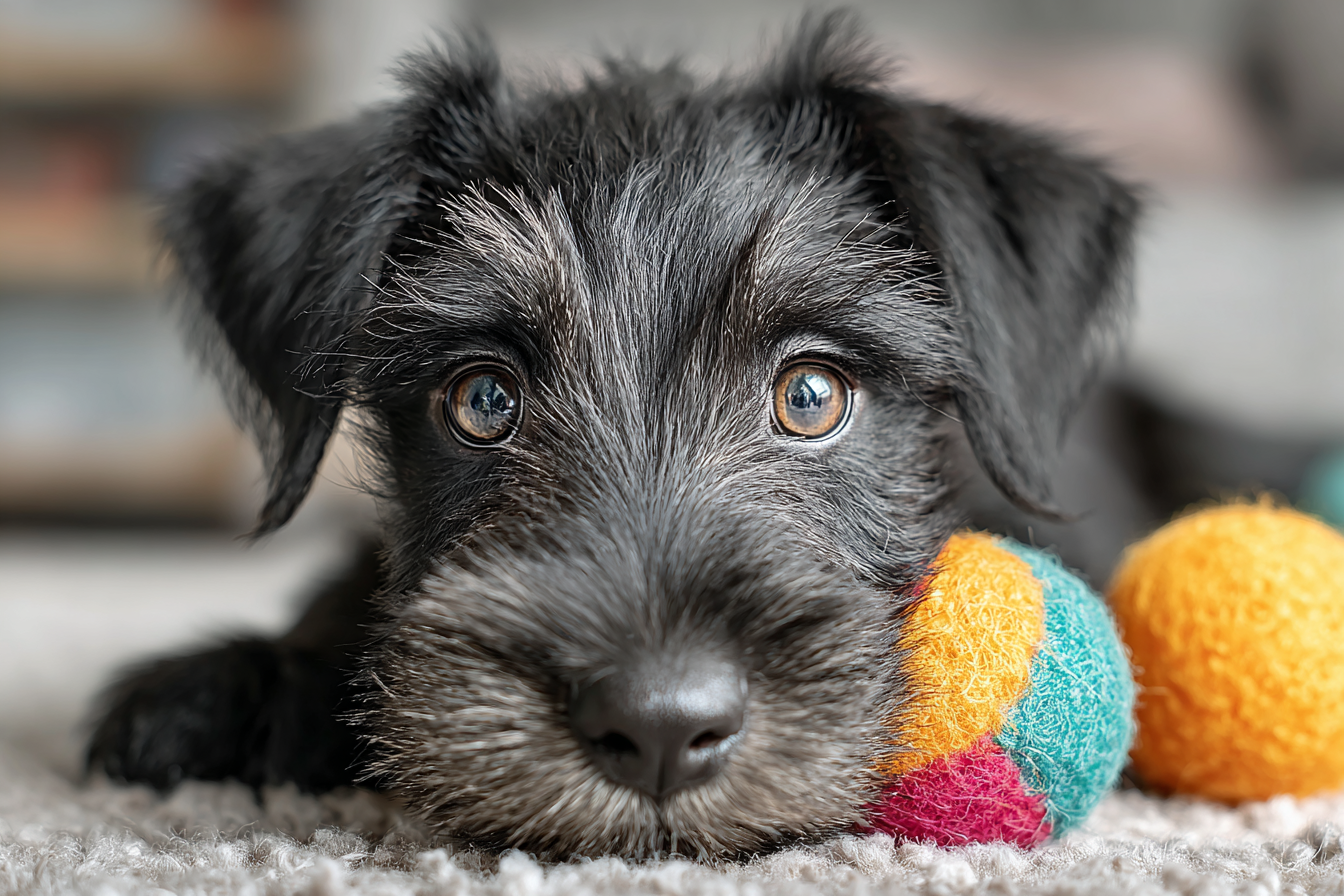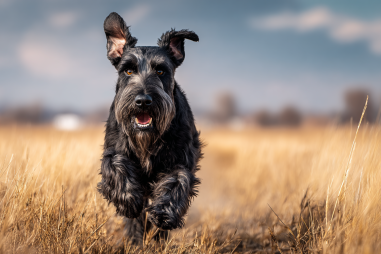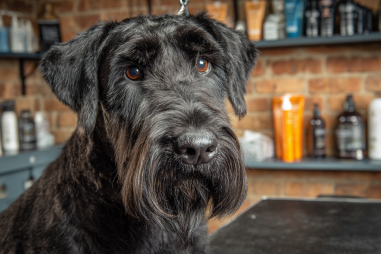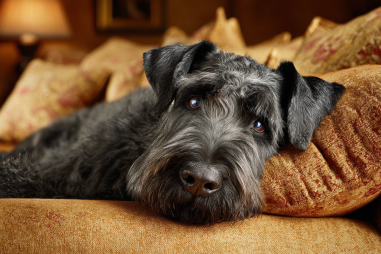Welcoming a Giant Schnauzer puppy into your home is an exciting adventure that comes with unique joys and responsibilities. These intelligent, strong, and loyal dogs grow quickly, and their early months are crucial for setting a foundation for a happy, healthy, and well-mannered adult dog. To help you navigate the wonderful journey of raising your Giant Schnauzer puppy, this guide covers essential care tips from understanding their needs to addressing challenges.
What to Expect with a Giant Schnauzer Puppy
Giant Schnauzers are known for their striking appearance, intelligence, and protective nature. As a puppy, you can expect an energetic, curious, and affectionate companion who will quickly become a central part of your family. These pups are robust, often weighing between 15 to 20 pounds at around 8 weeks, and they grow rapidly in their first year.
Developmentally, Giant Schnauzer puppies reach important milestones early. You’ll notice bursts of energy paired with moments where they simply want to cuddle. Their inquisitive nature means they love to explore their surroundings, so puppy-proofing your home will be important. They can also be quite vocal and alert, traits that make them excellent watchdogs later on.
Importantly, Giant Schnauzers are intelligent and eager to please, making training a rewarding experience if started early and done consistently. Keep in mind that their strong-willed streak requires gentle but firm guidance to develop positive behaviors.
Feeding and Nutrition for Puppies
Proper nutrition is the foundation of good health for your Giant Schnauzer puppy. Their rapid growth demands a diet rich in high-quality proteins, healthy fats, essential vitamins, and minerals designed specifically for large breed puppies. Choosing the right food helps support their developing bones, muscles, and immune system.
Here are some feeding tips to keep in mind:
- Select a premium puppy food formulated for large breeds: These formulas typically have controlled calcium and phosphorus levels to support healthy bone growth and prevent developmental issues.
- Establish a feeding schedule: Most Giant Schnauzer puppies thrive on three to four meals a day until they are about six months old. Afterward, you can gradually transition to two meals daily.
- Monitor portion sizes: Follow the guidelines on your puppy food packaging but adjust based on activity level and body condition. It’s important to avoid overfeeding to prevent obesity, which can strain growing joints.
- Fresh water: Always provide plenty of clean water to keep your puppy hydrated.
Avoid feeding your puppy human foods that can be toxic, such as chocolate, grapes, onions, and anything high in fat or sugar. If you’re uncertain about treats or supplements, consult your veterinarian for recommendations that suit your puppy’s specific needs.
Socialization and Early Training
One of the most critical aspects of raising a well-adjusted Giant Schnauzer is early socialization. This process involves gently exposing your puppy to a variety of people, animals, environments, noises, and experiences. Proper socialization reduces fearfulness and the risk of behavioral problems down the line.
Start socializing your puppy as soon as you bring them home, while also keeping them safe from contagious diseases by following your vet’s advice on vaccinations. Introduce your puppy to different environments such as parks, quiet streets, or pet-friendly stores. Encourage positive interactions with children, adults, and other dogs in controlled settings.
Training should begin early too. Giant Schnauzers are bright and responsive, making basic obedience training enjoyable for both owner and pup. Focus on:
- Basic commands: Teach sit, stay, come, and leave it using positive reinforcement with treats and praise.
- House training: Be patient and consistent with potty schedules, rewarding successes immediately.
- Crate training: Helps provide a safe haven and can aid in preventing destructive behaviors.
- Leash manners: Giant Schnauzers are strong, so teaching loose leash walking early makes for safer and more pleasant walks.
Regular training sessions that are short and fun are the best way to maintain your puppy’s interest and build a strong bond.
Health Care and Vaccinations
Keeping your Giant Schnauzer puppy healthy requires a proactive approach to veterinary care. From day one, regular vet visits are essential for preventive health measures and to monitor your puppy’s growth.
Vaccinations are a key part of protecting your puppy from serious illnesses such as parvovirus, distemper, and rabies. Your veterinarian will recommend a vaccination schedule tailored to your puppy’s age and risk factors. In addition, discuss parasite control for fleas, ticks, and worms.
Regular wellness exams allow your vet to catch any emerging health issues early. Common concerns for Giant Schnauzers include hip dysplasia, eye disorders, and some forms of autoimmune disease. Ensuring your puppy is from a responsible breeder who screens for these issues can reduce risk.
Dental health should not be overlooked. Start brushing your puppy’s teeth early to prevent plaque buildup and dental disease. Your vet can demonstrate proper techniques.
Creating a Safe and Comfortable Environment
Your home should be a secure and inviting space for your Giant Schnauzer puppy to thrive. Puppy-proofing is an important step. This includes keeping electrical cords out of reach, removing toxic plants or chemicals, and securing trash bins.
Provide your puppy with a comfortable sleeping area, such as a crate or a cozy dog bed, placed in a quiet part of your home but close enough that your puppy feels part of family activities. Puppies sleep a lot and need a calm retreat where they can rest undisturbed.
Ensure your puppy has access to safe toys that encourage chewing and play. Avoid items that are too small or easily destroyed to prevent choking hazards. Rotate toys regularly to keep your puppy engaged.
As your puppy grows, gradually introduce them to outdoor areas so they feel confident exploring and can expend their abundant energy.
Common Puppy Challenges and Solutions
Despite your best preparation, you may encounter some typical Giant Schnauzer puppy challenges. Being ready to address these will make the process smoother.
- Chewing and biting: Puppies explore the world with their mouths. Provide plenty of appropriate chew toys and redirect nipping or biting on people immediately with a firm “no” and a substitute toy.
- Excessive barking: Giant Schnauzers are alert dogs and can become quite vocal. Training “quiet” commands and ensuring they get enough physical and mental exercise helps reduce unnecessary barking.
- Separation anxiety: Since they form strong bonds, some Giant Schnauzers may struggle when left alone. Gradually increase alone time and create positive associations with your departures using treats or toys.
- Stubbornness: While intelligent, they can be independent. Patience and consistent, positive training techniques work best rather than harsh corrections.
Remember, all puppies have unique personalities, so adapt your approach and don’t hesitate to seek professional guidance from a trainer or vet behaviorist if needed.
Setting Your Giant Schnauzer Puppy Up for a Wonderful Life
Raising a Giant Schnauzer puppy is a deeply rewarding experience filled with fun, learning, and bonding. By understanding their specific needs and challenges—from nutrition and health care to socialization and training—you can help ensure that your puppy grows into a confident, healthy, and loving companion. Consistency, patience, and plenty of affection will go a long way in establishing a lifelong relationship based on trust and respect. Embrace the journey and enjoy every puppy moment along the way!







